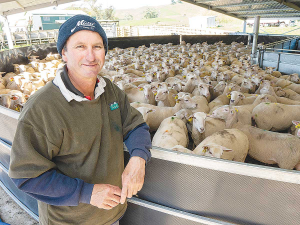Better late, than never!
Noted animal geneticist Dr Jock Allison is full of praise for the initiative to build a larger sheep milking industry.
 Paul White, at Green Park Sheep, the farm is expanding its milking ewe flock, from 850 to 1200, for its second season.
Paul White, at Green Park Sheep, the farm is expanding its milking ewe flock, from 850 to 1200, for its second season.
Stock expansion and management tweaks are on the cards for a couple of Waikato dairy sheep farmers coming to the end of their milking season.
Allan Browne and Paul White were among the frst farmers to enter the dairy sheep industry under the Maui Sheep Milk banner in 2020.
Allan and Toni Browne set up their family's Browne Pastoral operating near Cambridge, where they started milking 1,000 ewes using a prototype 70-stall Ultimo Internal Sheep Rotary designed by Waikato Milking Systems.
Paul and Dianne White set up Green Park Sheep near Te Awamutu for their sons Brad and Kieran and they also started their dairy sheep venture last year, milking 850 sheep through a 40-a-side Agili Rapid Exit plant, also by Waikato Milking Systems.
Browne Pastoral's final day of milking for the first season was on April 16 and Allan Browne said overall milk production had been better than expected.
"We've produced more than twice the forecast amount of milk we were meant to have made. So we've had to change to a larger vat, which I guess is a good problem to have."
Allan said there will be a few tweaks to the farm's management plan before the start of the new season.
"We were reactive rather than proactive to feeding. Pasture went off in quality and we were slow to react to that.
"This coming season we'll introduce a higher protein feed as the quality of the grass begins to lower."
Allan said the internal rotary milking system performed well. It had good flow once the animals were trained.
"We had little in the way of udder health problems so we can say we are pleased in that respect.
Allan thinks the farm may move up to 1,600 milking eyes for the new season, and possibly 2,000 the following year.
"We're not limited by land but really it's about how far the sheep can walk to the shed."
He said the family came from a sheep meat and wool farming background and had only moved into dairy cows seven years ago, so dairy sheep was still a new experience.
"We've used what we would normally do to fatten lambs as the basis to make milk and that's served us better than any dairy cow type of approach.
"They say what makes fat on a lamb's back makes milk in the vat, and that seems to be the case for us."
Green Park Sheep dried off its ewes in early April and Paul White said the new venture had met its milk production target for the first season.
"It's been a huge learning curve but Brad and Kieran are still enjoying it and that's the main thing."
The Agili inline milking system was converted from an old herringbone shed and it had performed well for the family during its first season.
"Brad and Kieran were milking about 680 sheep in an hour towards the end of the season, so it was really flying."
Outside of the shed, the family was looking to make changes to its lamb rearing programme in particular.
"Lamb rearing was a little bit more challenging than we thought.
"We are putting in a new rearing shed because we believe we can manage the animals better that way."
Paul said the rearing shed would allow the farm to move the lambs off the ewes earlier than last season, and that would give them an extra month of milk production.
There were also some tweaks to be made to the farm's fences which were put to the test by the lambs last year.
Green Park Sheep was also looking at expanding the flock to 1,200 milking ewes for next season.
Paul said they planned to start lambing in late July 20 and begin milking for the new season in August.
New Zealand and Chile have signed a new arrangement designed to boost agricultural cooperation and drive sector success.
New DairyNZ research will help farmers mitigate the impacts of heat stress on herds in high-risk regions of the country.
Budou are being picked now in Bridge Pā, the most intense and exciting time of the year for the Greencollar team – and the harvest of the finest eating grapes is weeks earlier than expected.
The Real Estate Institute of New Zealand (REINZ) has released its latest rural property report, providing a detailed view of New Zealand’s rural real estate market for the 12 months ending December 2025.
Rural retailer Farmlands has released it's latest round of half-year results, labeling it as evidence that its five-year strategy is delivering on financial performance and better value for members.
OPINION: "We are back to where we were a year ago," according to a leading banking analyst in the UK, referring to US president Donald Trump's latest imposition of a global 10% tariff on all exports into the US.
OPINION: Expect the Indian free trade deal to feature strongly in the election campaign.
OPINION: One of the world's largest ice cream makers, Nestlé, is going cold on the viability of making the dessert.